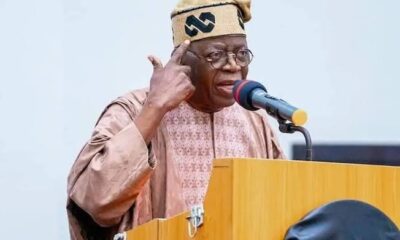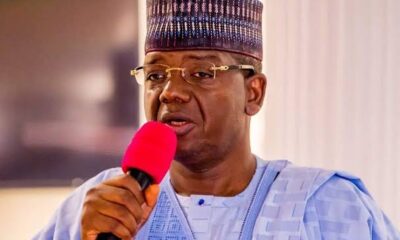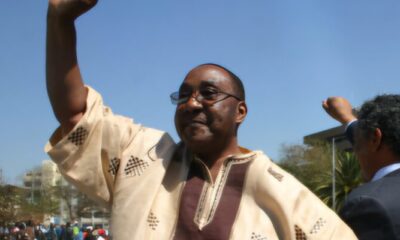Strictly Personal
From Experiment To Experience: Why the Nigerian Central Bank Needs its Traditional Navigators Back, By Chibuikem Ugo-Ngadi
Published
1 year agoon

Commerce Takes the Central Helm
If you’re tuning into this, you’re likely aware of Yemi Cardoso becoming the new chief of the Central Bank of Nigeria (CBN). His appointment, following Godwin Emefiele’s exit, is notable for another reason: both are commercial bankers, and their leadership comes at a pivotal moment for our economy.
For those who’ve journeyed with my earlier piece, ‘A Call To Action,’ I won’t delve into the detailed statistics again. However, to give you the big picture, our economy is on shaky ground. The naira’s value keeps dwindling, now taking over N1000 to match a single USD. The task of steadying this precarious situation leans heavily on the decisions and actions of the CBN and its helm.
While the trend of appointing commercial bankers to lead the CBN brings forth concerns, it’s not a question of their competency in the banking sector. They excel there. However, piloting the Central Bank has its own set of challenges distinct from commercial banking. The differences and intricacies of central banking are profound, and that’s where my reservations come into play.
Different Worlds
At first glance, central banks and commercial banks might seem to operate within the same realm – the financial sector. However, their mandates, operational scopes, risk management practices, and utilised tools delineate two distinct worlds.
Mandate:
Central banks serve a broader public interest. Their primary objective is maintaining economic stability for the nation. This means they work to control inflation and ensure steady economic growth. On the other hand, commercial banks are primarily business entities. Their driving force? Profit. They focus on attracting customers, granting loans, and providing other financial services to ensure their bottom line grows.
Scope of Operation:
Central banks have a wide lens, monitoring the entire economy. They pay close attention to various economic indicators and global trends to make informed decisions that impact the nation. Commercial banks, however, operate on a more individualized scale. They cater directly to their customers, whether individuals or businesses, offering services that respond to specific financial needs.
Risk Management:
When central banks think of risks, they’re looking at the bigger picture. They’re concerned about large-scale economic threats that can affect the whole country. Commercial banks, in contrast, handle risks that directly impact their day-to-day operations. This includes managing potential loan defaults or keeping up with shifts in the market.
Tools and Mechanisms:
Central banks use tools meant for guiding the entire economy. They employ methods like adjusting the amount of money in banks or setting key interest rates to influence economic conditions. Commercial banks, however, use their tools in a more direct manner. They decide on loan interest rates, offer deposit schemes, and introduce new financial products to attract and serve their customers better.
Navigating Two Worlds: Profit vs. Policy
Merging the distinct worlds of central and commercial banks requires careful consideration. While central banks are dedicated to ensuring national welfare and economic stability, commercial banks have profit as their primary goal. As commercial banking leaders transition into central banking roles, there’s a vital concern: could they inadvertently favour their previous domain?
This is more than just an economic dilemma—it directly influences the trust that the public places in these pillars of finance. Central banks are guardians of our financial health, setting rules to foster a robust economy. In contrast, the profit-driven nature of commercial banks often sees them navigating these rules inventively.
Furthermore, the importance of relationships in the commercial sector can’t be understated, yet central banking demands unwavering impartiality. Introducing a leader from the commercial world might blur the lines of decision-making, raising valid concerns about whether the broader economic interests remain the focal point.
Bypassing Expertise
In the intricate dance of global finance, the choreography of central banking leadership remains crucial. We’ve explored how central and commercial banks dance to different beats. Now, let’s shine a spotlight on Nigeria’s recent break from tradition.
Over the recent years, Nigeria has embarked on what can be termed a ‘recruitment experiment’. The rhythm shifted recently as the trend favoured promoting commercial bankers directly into the central bank’s top role, a distinct departure from traditional appointments. The result: Nigeria’s monetary choreography seems to have missed some crucial steps, leading to disruptions in our macroeconomic performance.
One can’t help but think this isn’t just a twist of fate. While the federal government’s fiscal choreography has certainly added complexity to the central bank’s performance, decisions like the FX Swaps, Naira Redesign Rollout, and Ways and Means Lending resonate as tunes unfamiliar to the seasoned central banking ear. It’s like a skilled ballerina suddenly trying to lead a breakdancing performance.
“Those that are doing it, do they have two heads?” as often quipped in Nigerian households. Globally, it’s a rarity to see a central bank led by someone without deep roots in central banking. While commercial bankers in other countries do occasionally don the central banker’s hat, they usually do so after an extensive apprenticeship in central bank policymaking.
Consider Jerome Powell of the US Fed: his journey from corporate banking and legal practice to the helm of the Fed spanned several years, allowing him to immerse in the central banking culture. Or Andrew Bailey of the Bank of England, whose decades-long waltz within the bank’s corridors prepared him for the top job. Even in emerging economies, leaders like Pan Gongsheng in China and Shakitanka Das in India have risen after extensive experience in their nation’s policy tapestries.
So, while commercial banking insights might offer some flair, nothing replaces the deep, nuanced expertise of a career spent in central banking. As the world’s financial ballet continues, it’s time Nigeria reconsiders its lead dancer.
The Pillars of Traditional Central Banking
Grounded Knowledge in Monetary Dynamics:
Central banking goes beyond mere figures. It’s a complex interplay of strategies, forecasts, and responses. Those who’ve spent their careers in central banking have a hands-on understanding of these complexities. They’ve been in the trenches, navigating global economic shifts, balancing inflation, and setting interest rates. This isn’t just textbook knowledge. They’ve witnessed how policy decisions play out in the real world, equipping them with insights that are tough to replicate.
Objectivity at the Helm:
In the vast world of finance, varying sectors sometimes have clashing goals. Career central bankers stand out with their honed objectivity. Their journey within the policy-centric environment of a central bank ensures they approach challenges without any tilt towards commercial banking influences. This unbiased stance guarantees decisions made prioritize the nation’s overall economic well-being.
Steady Policy Hand:
A stable economy thrives on clarity and predictability. Enterprises, investors, and the general public all benefit when there’s a consistent policy direction. Central bankers, with their repository of past experiences and policy impacts, offer this steady hand. Their decisions aren’t hasty but are rooted in long-term objectives, reducing abrupt policy changes that can disrupt markets.
Built-in Networking:
Years in the central banking sphere mean they’ve forged essential ties. They’ve worked side-by-side with diverse teams, partnered with governmental bodies, and conversed with international peers. These connections are invaluable. When a new policy is on the horizon or when feedback is needed, they have a ready network to tap into, ensuring efficient and informed decision-making.
Charting the Right Course
As Nigeria stands at the precipice of an unparalleled macroeconomic tempest, the actions of the Central Bank in the coming months will either anchor us firmly or leave us adrift. While the allure of shortcuts in policymaking might seem tempting, it’s crucial to remember that the Central Bank isn’t just another institution; it’s our nation’s flagbearer in the global financial arena. It’s our voice, our representative, asserting our place on the world stage.
The Central Bank should be our sanctuary from the pitfalls that often plague Nigerian policymaking. It should be a beacon of steadiness amidst the chaos, guiding our economic ship through tumultuous waters with an experienced hand at the helm.
To mitigate the challenges ahead, it’s imperative we revert to the tried-and-true: placing the keys of the Central Bank in the hands of those who know its every corner, its every nuance. For the health of our nation, the vibrancy of our economy, and the future of our people, it’s high time we return the Central Bank to its rightful stewards: the career central bankers.
You may like
-


Nigeria: 614,937 killed, 2.2m abducted in 1 year— Report
-


Nigeria obtains $600 million international loans for agriculture
-


Nigeria’s November inflation rate hits 34.60%
-


‘I don’t take pleasure in causing you pains,’ Tinubu tells Nigerians amid hardship
-


Nigeria’s Dangote Refinery exports first fuel to Cameroon
-


Nigeria: President Tinubu’s reforms, economic policies yielding positive results— Minister
Strictly Personal
Let’s merge EAC and Igad, By Nuur Mohamud Sheekh
Published
3 weeks agoon
November 27, 2024
In an era of political and economic uncertainty, global crises and diminishing donor contributions, Africa’s regional economic communities (RECs) must reimagine their approach to regional integration.
The East African Community (EAC) and the Intergovernmental Authority on Development (Igad), two critical RECs in East Africa and the Horn of Africa have an unprecedented opportunity to join forces, leveraging their respective strengths to drive sustainable peace and development and advance regional economic integration and promote the African Continental Free Trade Area (AfCFTA).
Already, four of the eight Igad member states are also members of the EAC and, with Ethiopia and Sudan showing interest, the new unified bloc would be formidable.
Igad’s strength lies in regional peacemaking, preventive diplomacy, security, and resilience, especially in a region plagued by protracted conflicts, climate challenges, and humanitarian crises. The EAC, on the other hand, has made remarkable strides in economic integration, exemplified by its Customs Union, Common Market, and ongoing efforts toward a monetary union. Combining these comparative advantages would create a formidable entity capable of addressing complex challenges holistically.
Imagine a REC that pairs Igad’s conflict resolution strengths with the EAC’s diplomatic standing and robust economic framework. Member states of both are also contributing troops to peacekeeping missions. Such a fusion would streamline efforts to create a peaceful and economically prosperous region, addressing the root causes of instability while simultaneously promoting trade investment and regional cooperation.
These strengths will be harnessed to deal with inter-state tensions that we are currently witnessing, including between Ethiopia and Somalia over the Somaliland MoU, strained relations between Djibouti and Eritrea, and the continually deteriorating relations between Eritrea and Ethiopia.
The global economy experienced as a result of the COVID-19 pandemic, compounded by the Ukraine war and competing global crises, has strained donor countries and reduced financial contributions to multilateral organisations and African RECs. Member states, many of which are grappling with fiscal constraints, are increasingly unable to fill this gap, failing to make timely contributions, which is in turn affecting key mandate areas of Igad and EAC, and staff morale.
A merger between Igad and EAC would alleviate this financial pressure by eliminating redundancies. Shared administrative systems, integrated programmes, and a unified leadership structure would optimise resources, enabling the new REC to achieve more with less. Staff rationalisation, while sensitive, is a necessary step to ensure that limited funds are channelled toward impactful initiatives rather than duplicative overheads.
The African Union (AU) envisions a fully integrated Africa, with RECs serving as the building blocks of the AfCFTA. A unified EAC-Igad entity would become a powerhouse for regional integration, unlocking economies of scale and harmonising policies across a wider geographical and economic landscape.
This merger would enhance the implementation of the AfCFTA by creating a larger, more cohesive market that attracts investment, fosters innovation, and increases competitiveness. By aligning trade policies, infrastructure projects, and regulatory frameworks, the new REC could serve as a model for others, accelerating continental integration.
The road to integration is not without obstacles. Political will, divergent institutional mandates, and the complexity of harmonising systems pose significant challenges. However, these hurdles are surmountable through inclusive dialogue, strong leadership, and a phased approach to integration.
Member states must prioritise the long-term benefits of unity over short-term political considerations. Civil society, the private sector, the youth, and international partners also have a critical role to play in advocating for and supporting this transformative initiative.
The time for EAC and Igad to join forces is now. By merging into a single REC, they would pool their strengths, optimise resources, and position themselves as a driving force for regional and continental integration. In doing so, they would not only secure a prosperous future for their citizens and member states but also advance the broader vision of an integrated and thriving Africa.
As the world grapples with crises, Africa must look inward, embracing the power of unity to achieve its potential. A combined Igad-EAC is the bold step forward that the continent needs.
Nuur Mohamud Sheekh, a diplomatic and geopolitical analyst based in London, is a former spokesperson of the Igad Executive Secretary. X: @NuursViews
Strictly Personal
Budgets, budgeting and budget financing, By Sheriffdeen A. Tella, Ph.D.
Published
4 weeks agoon
November 20, 2024
The budget season is here again. It is an institutional and desirable annual ritual. Revenue collection and spending at the federal, State and local government levels must be authorised and guided by law. That is what budget is all about. A document containing the estimates of projected revenues from identified sources and the proposed expenditure for different sectors in the appropriate level of government. The last two weeks have seen the delivery of budget drafts to various Houses of Assembly and the promise that the federal government would present its draft budget to the National Assembly.
Do people still look forward to the budget presentation and the contents therein? I am not sure. Citizens have realised that these days, governments often spend money without reference to the approved budget. A governor can just wake up and direct that a police station be built in a location. With no allocation in the budget, the station will be completed in three months. The President can direct from his bathroom that 72 trailers of maize be distributed to the 36 states as palliatives. No budget provision, and no discussion by relevant committee or group.
We still operate with the military mentality. We operated too long under the military and of the five Presidents we have in this democracy, two of them were retired military Heads of State. Between them, they spent 16 years of 25 years of democratic governance. Hopefully, we are done with them physically but not mentally. Most present governors grew up largely under military regimes with the command system. That is why some see themselves as emperor and act accordingly. Their direct staff and commissioners are “Yes” men and women. There is need for disorientation.
The importance of budget in the art of governance cannot be overemphasized. It is one of the major functions of the legislature because without the consideration and authorisation of spending of funds by this arm of government, the executive has no power to start spending money. There is what we refer to as a budget cycle or stages. The budget drafting stage within the purview of the executive arm is the first stage and, followed by the authorisation stage where the legislature discusses, evaluates and tinkers with the draft for approval before presenting it to the President for his signature.
Thereafter, the budget enters the execution phase or cycle where programmes and projects are executed by the executive arm with the legislature carrying out oversight functions. Finally, we enter the auditing phase when the federal and State Auditors verify and report on the execution of the budgets. The report would normally be submitted to the Legislature. Many Auditor Generals have fallen victim at this stage for daring to query the executives on some aspects of the execution in their reports.
A new budget should contain the objectives and achievements of the preceding budget in the introduction as the foundation for the budget. More appropriately, a current budget derives its strength from a medium-term framework which also derives its strength from a national Development Plan or a State Plan. An approved National Plan does not exist currently, although the Plan launched by the Muhammadu Buhari administration is in the cooler. President Tinubu, who is acclaimed to be the architect of the Lagos State long-term Plan seems curiously, disillusioned with a national Plan.
Some States like Oyo and Kaduna, have long-term Plans that serve as the source of their annual budgets. Economists and policymakers see development plans as instruments of salvation for developing countries. Mike Obadan, the former Director General of the moribund Nigeria Centre for Economic and Management Administration, opined that a Plan in a developing country serves as an instrument to eradicate poverty, achieve high rates of economic growth and promote economic and social development.
The Nigerian development plans were on course until the adoption of the World Bank/IMF-inspired Structural Adjustment Programme in 1986 when the country and others that adopted the programme were forced to abandon such plan for short-term stabilisation policies in the name of a rolling plan. We have been rolling in the mud since that time. One is not surprised that the Tinubu administration is not looking at the Buhari Development Plan since the government is World Bank/IMF compliant. It was in the news last week that our President is an American asset and by extension, Nigeria’s policies must be defined by America which controls the Bretton Woods institutions.
A national Plan allows the citizens to monitor quantitatively, the projects and programmes being executed or to be executed by the government through the budgeting procedure. It is part of the definitive measures of transparency and accountability which most Nigerian governments do not cherish. So, you cannot pin your government down to anything.
Budgets these days hardly contain budget performance in terms of revenue, expenditure and other achievements like several schools, hospitals, small-scale enterprises, etc, that the government got involved in successfully and partially. These are the foundation for a new budget like items brought forward in accounting documents. The new budget should state the new reforms or transformations that would be taking place. Reforms like shifting from dominance of recurrent expenditure to capital expenditure; moving from the provision of basic needs programmes to industrialisation, and from reliance on foreign loans to dependence on domestic fund mobilisation for executing the budget.
That brings us to the issue of budget deficit and borrowing. When an economy is in recession, expansionary fiscal policy is recommended. That is, the government will need to spend more than it receives to pump prime the economy. If this is taken, Nigeria has always had a deficit budget, implying that we are always in economic recession. The fact is that even when we had a surplus in our balance of payment that made it possible to pay off our debts, we still had a deficit budget. We are so used to borrowing at the national level that stopping it will look like the collapse of the Nigerian state. The States have also followed the trend. Ordinarily, since States are largely dependent on the federal government for funds, they should promote balanced budget.
The States are like a schoolboy who depends on his parents for school fees and feeding allowance but goes about borrowing from classmates. Definitely, it is the parents that will surely pay the debt. The debt forgiveness mentality plays a major role in the process. Having enjoyed debt forgiveness in the past, the federal government is always in the credit market and does not caution the State governments in participating in the market. Our Presidents don’t feel ashamed when they are begging for debt forgiveness in international forum where issues on global development are being discussed. Not less than twice I have watched the countenance of some Presidents, even from Africa, while they looked at our president with disdain when issues of debt forgiveness for African countries was raised.
In most cases, the government, both at the federal and state cannot show the product of loans, except those lent by institutions like the World Bank or African Development Bank for specific projects which are monitored by the lending institutions. In other cases, the loans are stolen and transferred abroad while we are paying the loans. In some other cases, the loans are diverted to projects other than what the proposal stated. There was a case of loans obtained based on establishing an international car park in the border of the State but diverted to finance the election of a politician in the State. The politician eventually lost the election but the citizens of the State have to be taxed to pay the loan. Somebody as “Nigeria we hail thee”.
Transformation in budgeting should commence subsequently at the State and federal level. Now that local government will enjoy some financial autonomy and therefore budgeting process, they should be legally barred from contracting foreign loans. They have no business participating in the market. They should promote balanced budget where proposed expenditures must equal the expected revenues from federal and internal sources. The State government that cannot mobilise, from records, up to 40 percent of its total budget from IGR should not be supported to contract foreign loans. The States should engage in a balanced budget. The federal government budget should shift away from huge allocations to recurrent expenditure towards capital expenditure for capital formation and within the context of a welfarist state.
Sheriffdeen A. Tella, Ph.D.
EDITOR’S PICK


Ghana’s Supreme Court dismisses suit challenging anti-LGBT bill
Ghana’s Supreme Court has dismissed two separate suits challenging the legality of one of the proposed anti-LGBT legislations awaiting assent...


Kenya’s ticketing startup BuuPass partners Flexpay for flexible travel payments
Kenyan digital ticketing startup, BuuPass, has entered into a partnership with goal-based savings platform, Flexpay, to offer customers flexible payment...


Zambian court orders ex-Defence minister to pay $899,970, K10m to govt
A Lusaka Magistrates’ Court has ordered jailed former Zambian Minister of Defence, Geoffrey Mwamba, to pay the government the sum...


Ghana: President-elect Mahama appoints anti-corruption team
According to a statement released by his transition team on Wednesday, Ghana’s President-elect, John Dramani Mahama, has designated an anti-corruption...


Nigerian woman trafficked to Iraq cries out for help, begs to return home
A young Nigerian lady identified as Odunayo Eniola Isaac, who is a victim of human trafficking, has cried out for...


DR Congo sues tech giant Apple over illegal mineral exploitation
The Democratic Republic of Congo (DRC), has filed a criminal case against the European subsidiaries of tech giant, Apple, accusing...


UNESCO lists Ghana’s Kente cloth as cultural heritage
The iconic Ghanaian Kente, a piece of clothing, has been recognized as a cultural heritage on UNESCO’s Representative List of...


Zambia: FOX report highlights persistent media harassment, calls for reforms
A new Freedom of Expression (FOX) report by the Media Institute for Southern Africa (MISA) Zambia, has raised concerns over...


Egyptian court upholds ex-presidential candidate Ahmed Tantawy’s sentence
Former presidential candidate, Ahmed Tantawy, and his campaign manager, Mohamed Abou El-Diar, were found guilty of faking election paperwork, and...


Court orders Uganda to compensate LRA war crimes victims
Uganda’s tribunal has ordered the government to pay up to 10 million Ugandan shillings ($2,740) to each victim of Lord’s...
Trending
-

 VenturesNow2 days ago
VenturesNow2 days agoIMF’s latest board reviews result in $182 million to Rwanda
-

 Politics2 days ago
Politics2 days agoCourt orders Uganda to compensate LRA war crimes victims
-

 Politics2 days ago
Politics2 days agoEgyptian court upholds ex-presidential candidate Ahmed Tantawy’s sentence
-

 VenturesNow2 days ago
VenturesNow2 days agoNigeria’s November inflation rate hits 34.60%


